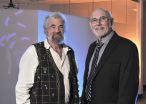Aspirin or blood pressure medication before and after surgery does not reduce risk of AKI
2014-11-15
(Press-News.org) In patients undergoing noncardiac surgery, neither aspirin nor clonidine (a medication primarily used to treat high blood pressure) taken before and after surgery reduced the risk of acute kidney injury, according to a study appearing in JAMA. The study is being released to coincide with its presentation at the American Society of Nephrology's annual Kidney Week meeting.
About 10 percent of the 200 million adults estimated to undergo major noncardiac surgery each year develop acute kidney injury (a sudden loss of kidney function). Perioperative (around the time of surgery) acute kidney injury is associated with poor outcomes, a long hospital stay, and high health care costs. Some studies suggest aspirin or clonidine administered during the perioperative period reduces the risk of acute kidney injury; however these effects are uncertain and each intervention has the potential for harm (bleeding with aspirin and abnormally low blood pressure with clonidine), which could increase the risk of acute kidney injury, according to background information in the article.
Amit X. Garg, M.D., Ph.D., of the London Health Sciences Centre and Western University, London, Ontario, Canada, and colleagues randomly assigned 6,905 patients undergoing noncardiac surgery from 88 centers in 22 countries to take aspirin (200 mg) or placebo 2 to 4 hours before surgery and then aspirin (100 mg) or placebo daily up to 30 days after surgery; oral clonidine (0.2 mg) or placebo 2 to 4 hours before surgery, and then a transdermal clonidine patch (applied to the skin) or placebo patch that remained until 72 hours after surgery. Acute kidney injury was primarily defined as a certain increase in serum creatinine concentration (a substance commonly found in blood, urine, and muscle tissue and used as an indicator of kidney function).
The researchers found that neither aspirin nor clonidine reduced the risk of acute kidney injury. The percentage of patients in each study group who experienced acute kidney injury: aspirin 13.4 percent vs 12.3 percent (placebo); clonidine 13.0 percent vs 12.7 percent (placebo).
Aspirin increased the risk of major bleeding. In turn, major bleeding was associated with a greater risk of subsequent acute kidney injury (23.3 percent when bleeding was present vs 12.3 percent when bleeding was absent). Similarly, clonidine increased the risk of clinically important hypotension (abnormally low blood pressure). Such hypotension was associated with a greater risk of subsequent acute kidney injury (14.3 percent when hypotension was present vs 11.8 percent when hypotension was absent).
The authors write that future large trials to prevent acute kidney injury in the surgical setting should focus on interventions that target pathways other than inhibiting platelet aggregation and alpha 2-adrenergic agonism. "Interventions that prevent perioperative bleeding and perioperative hypotension may prove useful."
(doi:10.1001/jama.2014.15284; Available pre-embargo to the media at http://media.jamanetwork.com)
INFORMATION:
Editor's Note: Please see the article for additional information, including other authors, author contributions and affiliations, financial disclosures, funding and support, etc.
Editorial: Prevention of Acute Kidney Injury Using Vasoactive or Antiplatelet Treatment
Wolfgang C. Winkelmayer, M.D., M.P.H., Sc.D., of the Baylor College of Medicine, Houston, and Associate Editor, JAMA, and Kevin W. Finkel, M.D., of the University of Texas Medical School, Houston, comment on this study in an accompanying editorial.
"In their contribution, Garg and colleagues once again have embarked on a promising mechanism to generate evidence for kidney outcomes, which involved partnering with investigators of large cardiovascular trials and proposing (and then executing) ancillary studies of kidney-relevant end points. Given the disproportionate paucity of randomized trials in nephrology, this is a useful and economical approach, especially in light of the many risk factors that cardiovascular disease and both acute and chronic kidney disease share. It is almost unfathomable that funding agencies would have funded a stand-alone trial of interventions for the primary prevention of acute kidney injury of the size and scope of [this study]."
(doi:10.1001/jama.2014.14548; Available pre-embargo to the media at http://media.jamanetwork.com)
Editor's Note: Please see the article for additional information, including financial disclosures, funding and support, etc.
ELSE PRESS RELEASES FROM THIS DATE:
2014-11-15
Among kidney transplant recipients, a 3-month course of the antibiotic levofloxacin following transplantation did not prevent the major complication known as BK virus from appearing in the urine. The intervention was associated with an increased risk of adverse events such as bacterial resistance, according to a study appearing in JAMA. The study is being released to coincide with its presentation at the American Society of Nephrology's annual Kidney Week meeting.
Kidney transplantation is the preferred treatment for endstage renal disease. The development of potent ...
2014-11-15
Taipei, November 15, 2014 - While a low body mass index (BMI) of less than 20 kg/m2 has been shown to be an independent risk factor for hip fractures, far less is known about the relationship of body weight changes on hip fracture risk.
The findings of a new study presented today at the IOF Regionals Asia-Pacific Osteoporosis Meeting in Taipei, show that among middle-aged to elderly Singapore Chinese, weight loss of 10% or more was associated with a 56% higher hip fracture risk.
The researchers used data from the Singapore Chinese Health Study, a population-based cohort ...
2014-11-15
Taipei, November 15, 2014 - An epidemiological study presented today at the 5th Asia-Pacific Osteoporosis Meeting is one of the first to project the immense and growing economic cost of osteoporotic fractures in China.
The study, by investigators from the University of Tasmania, Anhui Medical University and Nanjing Medical University, used decision analytic modelling to estimate the burden of osteoporotic fractures. The researchers estimated that in 2010 more than 2.3 million osteoporosis-related hip, clinical vertebral and wrist fractures occurred in the population ...
2014-11-15
DALLAS - November 15, 2014 - A novel looping mechanism that involves the end caps of DNA may help explain the aging of cells and how they initiate and transmit disease, according to new research from UT Southwestern Medical Center cell biologists.
The UT Southwestern team found that the length of the endcaps of DNA, called telomeres, form loops that determine whether certain genes are turned off when young and become activated later in life, thereby contributing to aging and disease.
"Our results suggest a potential novel mechanism for how the length of telomeres may ...
2014-11-14
Philadelphia, PA (November 14, 2014) -- In addition to helping patients shed pounds, weight loss surgery may also improve kidney function, according to a study that will be presented at ASN Kidney Week 2014 November 11¬-16 at the Pennsylvania Convention Center in Philadelphia, PA.
Weight loss, or bariatric, surgery is highly effective for rapid weight loss in patients with morbid obesity, who are at markedly increased risk for kidney failure. Because the effect of bariatric surgery-induced weight loss on kidney function is unknown, Alex Chang, MD (Geisinger Medical ...
2014-11-14
Philadelphia, PA (November 14, 2014) -- The majority of individuals in the United States are not eligible to donate a kidney, even if they wanted to, according to a study that will be presented at ASN Kidney Week 2014 November 11¬-16 at the Pennsylvania Convention Center in Philadelphia, PA.
There is a shortage of living kidney donors in the United States, but no one has previously examined the general population to see who would be eligible to be donors. To assess the potential US donor pool, researchers led by Anthony Bleyer, MD (Wake Forest Baptist Medical Center) ...
2014-11-14
Philadelphia, PA (November 14, 2014) -- Simple exercises can help improve the health of patients with kidney disease, according to studies that will be presented at ASN Kidney Week 2014 November 11¬-16 at the Pennsylvania Convention Center in Philadelphia, PA.
Heart disease is the leading cause of death in patients with chronic kidney disease (CKD). Because exercise capacity is significantly reduced in CKD patients, Sharlene Greenwood, MD (King's College Hospital, in London) and her colleagues examined the effect of 12 months of exercise training on kidney function ...
2014-11-14
DARIEN, IL - A new study suggests that teen drivers who start class earlier in the morning are involved in significantly more motor vehicle accidents than peers with a later high school start time. The results underscore the importance of the "Awake at the Wheel" campaign of the National Healthy Sleep Awareness Project.
Results show that the weekday crash rate for teen drivers during the 2009 to 2010 school year was about 29 percent higher in Chesterfield County, Va., where high school classes began at 7:20 a.m., than in adjacent Henrico County, Va., where classes started ...
2014-11-14
VIDEO:
What is Nutrigenomix? Here's a primer.
Click here for more information.
Researchers from the University of Toronto (U of T) report that personalized dietary advice based on a person's genetic makeup improves eating habits compared to current "one-size-fits-all" dietary recommendations. The findings were published online today in the journal PLoS One.
"We conducted the first randomized controlled trial to determine the impact of disclosing DNA-based dietary advice on ...
2014-11-14
Each year, the National Science Foundation (NSF) receives about 50,000 proposals for research funding in all fields of science and engineering from all corners of the country. NSF distinguishes among the proposals through a competitive review process built on two criteria: intellectual merit and broader impacts--will the research advance knowledge and will it benefit society?
Today, NSF released a special report to showcase broader impacts and examples of the diverse and far-reaching ways NSF-supported science touches our lives.
"Intellectual merit and broader impacts ...
LAST 30 PRESS RELEASES:
[Press-News.org] Aspirin or blood pressure medication before and after surgery does not reduce risk of AKI


